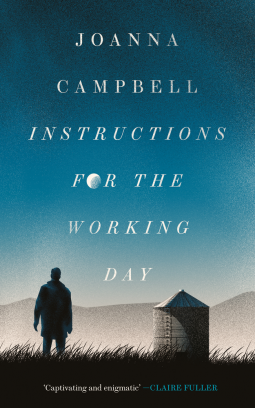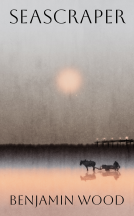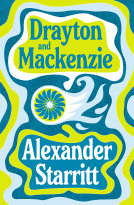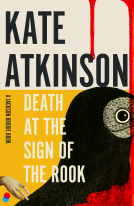
Instructions for the Working Day
by Joanna Campbell
This title was previously available on NetGalley and is now archived.
Send NetGalley books directly to your Kindle or Kindle app
1
To read on a Kindle or Kindle app, please add kindle@netgalley.com as an approved email address to receive files in your Amazon account. Click here for step-by-step instructions.
2
Also find your Kindle email address within your Amazon account, and enter it here.
Pub Date 1 Sep 2022 | Archive Date 2 Sep 2022
Talking about this book? Use #InstructionsfortheWorkingDay #NetGalley. More hashtag tips!
Description
'You go too far, my friend. You are near dangerous ground.'
Neil Fischer owns a village. Having inherited his father's former hometown of Marschwald in East Germany, left to deteriorate since the fall of the Berlin Wall, Neil faces the task of deciphering his demanding father's last wish and restoring the derelict village to its former glory. But when he travels to Marschwald with plans to renovate and revive it, he is met with hostility, mistrust and underlying menace.
His only friend in Marschwald is Silke, who is coming to terms with her traumatic experiences during the Cold War and has recently uncovered a shocking truth, concealed from her for years by her controlling brother. As tensions rise, a series of surreal encounters force Neil to contend with his own troubled past – but in his present, all signs point to danger.
Advance Praise
‘I love how this seemingly quiet novel is also one of extremes: funny and tragic, captivating and disturbing. Joanna Campbell has written a mind-bending and enigmatic story that blurs the lines between thought and reality’ — Claire Fuller, author of Costa prize-winning Unsettled Ground
‘I’ve been a fan of Joanna Campbell’s short stories for some time now and it’s a joy to see her turn her considerable talents to the novel. I hope this wonderful book brings her the wider recognition she so deserves’ — Paul McVeigh, author of The Good Son, winner of the Polari Prize 2016
‘An evocative and poignant novel exploring home and family and the hold of the past. Totally absorbing’ — Alison Moore, author of the Man Booker-shortlisted The Lighthouse
Available Editions
| EDITION | Other Format |
| ISBN | 9781914148156 |
| PRICE | US$24.95 (USD) |
| PAGES | 256 |
Featured Reviews
 Susan O, Reviewer
Susan O, Reviewer
Set in a dilapidated village, Instructions for the Working Day follows Neil Fischer who has inherited this settlement from his father whose childhood home it was, exploring the fallout from the fall of the Berlin Wall, heralded as a liberation by the west.
Neil has travelled to Marschwald to assess its state and whether it can be restored. Hostility and silence greet him at every turn; only Silke with whom he’s lodging, welcomes him. The villagers have high expectations and are unimpressed with this man who now owns their crumbling homes. Thirty years after the Wall came down, Silke has decided to visit Berlin where she spent barely a term at university. What she discovers there is devastating, a secret she confides in Neil who has his own revelations to deal with.
This is a quietly riveting novel, hard to write about without out giving too much away. Campbell switches between the present and the past, exploring the aftermath of the Wall’s fall from both Neil’s and Silke’s perspectives as she unfolds their backstories: Neil’s childhood as the son of a controlling father given to playing mind-games with his son from which he’s never recovered, his grip on reality tenuous; Silke’s attempts to escape a regime whose surveillance machine was vast, recruited from friends, family and neighbours, and her determination to learn the truth. Freedom was a longed for prize for many, but it came with a high psychological cost to those who had long been schooled to fear what was on the other side of a barrier supposedly erected to defend them. Campbell leaves you with much to contemplate while delivering a suspenseful piece of storytelling which had me gripped to its end.
In the end this is quite a dark novel about oppression both by society and family. At the start of the novel Neil inherits his fathers home village in Germany. His father was an overbearing and demanding father and husband. When Neil gets to the town of Marschwald, it is decrepit and rundown since the fall of the Berlin Wall and the people are suspicious and unfriendly. He stays with sister and brother, Silke and Thomas in their dilapidated house. They have their own difficult relationship. The story is told with flashbacks to Neil’s childhood and Silke’s life at University in East Berlin. The pacing is slow but engrossing. As the truth of both characters histories are revealed it’s hard to look away. And the end! I didn’t expect that.
 Susan B, Reviewer
Susan B, Reviewer
What an interesting book this is. It has a great premise but delivers more, mainly through incredibly evocative writing of place and characters.
Instructions is the story of Neil, whose father has died and has left him a village in the former East Germany, built on marshes and left to deteriorate badly. Neil's relationship with his father was strained, to say the least, and we learn more about this as the book goes on. Neil has made some money back in England revamping old houses and selling them on, and is keen to try out some of his skills in Germany, to help bring the village back to life the way he assumes his father would have wanted.
However, it was never going to be that simple. When Neil arrives at the village, he The villagers are distrustful and wary of him, perhaps for obvious reasons, it is immediately clear that the problems of the village will need more work than the basic skills that Neil has to offer.
Neil stays with brother and sister Thomas and Silke, with one of the only habitable houses in the place. Silke does her bit to welcome Neil but there is clearly a strange atmosphere between the siblings, more secrets for the reader to uncover. Silke takes Neil into her confidence and asks him to drive her to Berlin so that she can investigate her past. When she does so, the final layer of the book is uncovered.
The book has a supernatural element which manifests itself through hallucinations and dreams, which contributes to the story in a way, but the strongest element of the book is the place itself. The village is dank, lingering in grey damp unpleasantness and the troubled history is always there with the inhabitants, almost like you travel back in time or that the village is haunted. It's evocative and the sense of place is very well written.
What also comes through strongly is how much the past shapes everything; all these characters are deeply impacted by their personal history and the lingering effects of the East German regime on the people.
This is a strong debut from Joanna Campbell but it is a solemn book, blending surreal elements, dark humour and tragedy into one absorbing read.


















